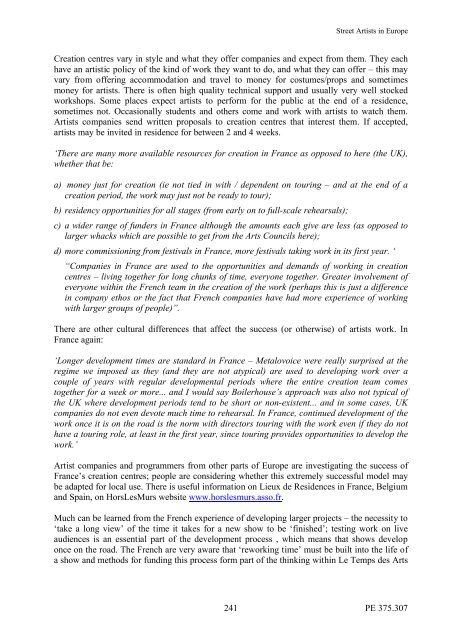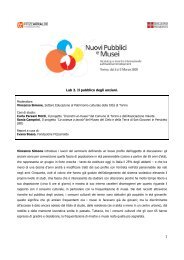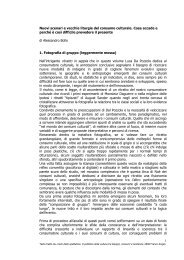STREET ARTISTS IN EUROPE - Fondazione Fitzcarraldo
STREET ARTISTS IN EUROPE - Fondazione Fitzcarraldo
STREET ARTISTS IN EUROPE - Fondazione Fitzcarraldo
You also want an ePaper? Increase the reach of your titles
YUMPU automatically turns print PDFs into web optimized ePapers that Google loves.
Street Artists in Europe<br />
Creation centres vary in style and what they offer companies and expect from them. They each<br />
have an artistic policy of the kind of work they want to do, and what they can offer – this may<br />
vary from offering accommodation and travel to money for costumes/props and sometimes<br />
money for artists. There is often high quality technical support and usually very well stocked<br />
workshops. Some places expect artists to perform for the public at the end of a residence,<br />
sometimes not. Occasionally students and others come and work with artists to watch them.<br />
Artists companies send written proposals to creation centres that interest them. If accepted,<br />
artists may be invited in residence for between 2 and 4 weeks.<br />
‘There are many more available resources for creation in France as opposed to here (the UK),<br />
whether that be:<br />
a) money just for creation (ie not tied in with / dependent on touring – and at the end of a<br />
creation period, the work may just not be ready to tour);<br />
b) residency opportunities for all stages (from early on to full-scale rehearsals);<br />
c) a wider range of funders in France although the amounts each give are less (as opposed to<br />
larger whacks which are possible to get from the Arts Councils here);<br />
d) more commissioning from festivals in France, more festivals taking work in its first year. ‘<br />
“Companies in France are used to the opportunities and demands of working in creation<br />
centres – living together for long chunks of time, everyone together. Greater involvement of<br />
everyone within the French team in the creation of the work (perhaps this is just a difference<br />
in company ethos or the fact that French companies have had more experience of working<br />
with larger groups of people)”.<br />
There are other cultural differences that affect the success (or otherwise) of artists work. In<br />
France again:<br />
‘Longer development times are standard in France – Metalovoice were really surprised at the<br />
regime we imposed as they (and they are not atypical) are used to developing work over a<br />
couple of years with regular developmental periods where the entire creation team comes<br />
together for a week or more... and I would say Boilerhouse’s approach was also not typical of<br />
the UK where development periods tend to be short or non-existent... and in some cases, UK<br />
companies do not even devote much time to rehearsal. In France, continued development of the<br />
work once it is on the road is the norm with directors touring with the work even if they do not<br />
have a touring role, at least in the first year, since touring provides opportunities to develop the<br />
work.’<br />
Artist companies and programmers from other parts of Europe are investigating the success of<br />
France’s creation centres; people are considering whether this extremely successful model may<br />
be adapted for local use. There is useful information on Lieux de Residences in France, Belgium<br />
and Spain, on HorsLesMurs website www.horslesmurs.asso.fr.<br />
Much can be learned from the French experience of developing larger projects – the necessity to<br />
‘take a long view’ of the time it takes for a new show to be ‘finished’; testing work on live<br />
audiences is an essential part of the development process , which means that shows develop<br />
once on the road. The French are very aware that ‘reworking time’ must be built into the life of<br />
a show and methods for funding this process form part of the thinking within Le Temps des Arts<br />
241<br />
PE 375.307






